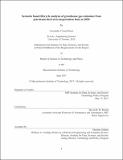Scenario based lifecycle analysis of greenhouse gas emissions from petroleum-derived transportation fuels in 2050
Author(s)
Rosen, Cassandra Vivian
DownloadFull printable version (1.003Mb)
Other Contributors
Technology and Policy Program.
Advisor
Steven R. H. Barrett.
Terms of use
Metadata
Show full item recordAbstract
Petroleum-derived fuels made up 93% of the energy demand for the transportation sector in 2013, and are projected to remain a significant source in the future (65% to 90% in the year 2040) [1]. These fuels contribute significantly to global green house gas (GHG) emissions, both from their production and combustion emissions. Production emissions make up one fifth of the emissions associated with the entire petroleum fuel lifecycle. Although the current non-combustion production lifecycle emissions of these fuels are well understood, their future lifecycle emissions have yet to be quantified. In this thesis, a global, scenario-based analysis of petroleum-derived transportation fuels is carried out to estimate lifecycle emissions in the year 2050. The 2050 scenarios differ by the stringency of environmental policies, including no new additional policies, "moderate" new policies, and "'strong" new policies. Data from existing projections for the energy sector in 2050 is used to create lifecycle inventories for the three 2050 scenarios. The production lifecycle emissions for the year 2050 are calculated to be 14.3 - 19.2 g CO2e/MJ for jet fuel, 17.2 - 24.9 g CO2e/MJ for diesel, and 21.1 - 26.8 g CO2e/MJ for gasoline. The production emissions in 2050 could deviate from 2020 values by as much as +20% to -21%, depending on future policy choices. If these production emissions are applied to global fuel demand, the range of emissions reductions from these policy scenarios spans 8.5% of all GHG emissions in 2013.
Description
Thesis: S.M. in Technology and Policy, Massachusetts Institute of Technology, School of Engineering, Institute for Data, Systems, and Society, Technology and Policy Program, 2017. This electronic version was submitted by the student author. The certified thesis is available in the Institute Archives and Special Collections. Cataloged from student-submitted PDF version of thesis. Includes bibliographical references (pages 88-96).
Date issued
2017Department
Massachusetts Institute of Technology. Engineering Systems Division; Massachusetts Institute of Technology. Institute for Data, Systems, and Society; Technology and Policy ProgramPublisher
Massachusetts Institute of Technology
Keywords
Institute for Data, Systems, and Society., Engineering Systems Division., Technology and Policy Program.